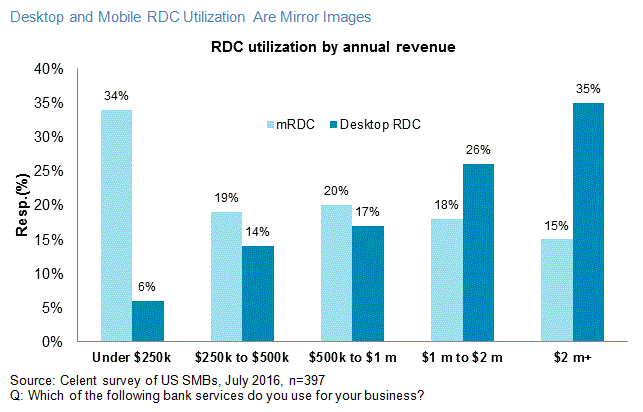Celent conservatively estimates 4 million US SMBs could adopt business mobile deposit if banks position and price the product effectively. This report shows banks how.

In the report Positioning Business Mobile Deposit to Win with SMBs: The Devil’s in the Details,Celent offers an analysis of a June 2016 survey of US small businesses designed to help banks maximize their return on investment in RDC.
The small and medium size business (SMB) market is of increasing interest among US financial institutions as an important and profitable customer segment. So is the idea of migrating expensive branch transactions to self-service channels. The advent of business mobile deposit, which became generally available in 2015, offers banks a unique opportunity to “kill two birds with one stone.” But doing so is tricky, because:
- The SMB market is diverse, with widely varying affinity for business mobile deposit. Product and positioning will need to uniquely fit for the value proposition to resonate.
- Banks have taught SMBs to expect free stuff. Thus, most SMBs expect business mobile deposit to be free, or at least have a very low price point.
- Many SMBs already use desktop deposit (also known as commercial RDC). Unless they’re careful, banks risk cannibalizing existing fee revenue with business mobile deposit.
The survey showed that check acceptance remains widespread among US SMBs, but most SMBs don’t receive all that many checks. Historic RDC adoption followed the checks: higher check volume meant a business was more likely to adopt desktop RDC. But, more SMBs today utilize mRDC (launched in the past few years) than desktop RDC, which has been broadly available for a decade. This suggests both risk and opportunity for US financial institutions.

“Small business remains fertile ground for RDC,” says Bob Meara, a senior analyst with Celent’s Banking practice and author of the report. “There’s opportunity for fee-based revenue growth as well as massive transaction migration out of the branch. This is low-hanging fruit banks have been slow to pick.”
After a definition of business mobile deposit, the report takes a snapshot of the US small business market, with a focus on check acceptance, deposit behavior, and product usage. An analysis of surveyed SMB reactions to business mobile deposit concepts follows, along with a market opportunity assessment and recommendations for financial institutions offering or intending to offer business mobile deposit to SMB clients.





